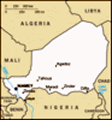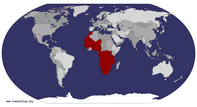Advertisement
Published: August 24th 2006

 Agali
Agali
Trustworthy chameliereThe ceiling was black; or was it white? Or did it actually change colour depending on the time of the day?
That was all that I could grasp as I lay in bed with Miss Malaria, munching medicines.
In the hallway outside my room - high-heeled prostitutes “
clicketi-clacketed” back and forth with their new and old customers - and outside our questionable hotel - unenthusiastic independence-day celebrations took place.
Slowly my strength returned and I ventured out into the flooded streets of
Niamey -
the city of flies - the capital of Niger.
Always poor, dirty and hot, and at most times it’s also very dusty. Now - thanks to the heavy rains - with all its dust fixed into pools of brown sluggish liquid - we waded through the city.
At times the pools were ankle deep - at times a lot deeper, hiding sharp metal scrap, animal carcasses and excretion.
After a week we had had it and jumped on a bus heading north into the desert.
Feeble gatherings of sand turned into small islands of aridity in a sea of grass and low bushes. Small islands of aridity that -

 Last grass
Last grass
Sand, sand and sand. Entering the Sahara.as we continued north - grew and grew in size until they finally overpowered the surrounding vegetation. Then islands of dusty greenery shrank and shrank in size into small feeble turfs of dried grass that finally disappeared.
Gone were the
Sahel and left were a dry and rocky landscape - sparsely dotted with uninviting thorn-trees, decorated with black plastic bags.
It needed little introduction to us. We were back in the
Sahara.
After 15 hours of monotonous driving (broken by few well needed stops) we left the last city of any major size and continued for our goal
Arlit, the epicentre of the Sahara.
Two hours passed and the sun slowly sank towards the horizon. In the faraway distance a storm danced over the flat landscape.
Suddenly, with great rapidity it started to move towards us. The driver drove faster and faster while the whole bus sat petrified, watching the approaching storm.
First a wave of silently whispering sand blew along the ground, not higher than a foot or two. Then, as all the windows were being hastily shut, the storm struck us.
Everything outside turned ochre, the driver slowed down and the
wind started to shake the bus more and more aggressively.
The visibility sank quickly;
50 metres.
30 metres, the driver hit the brake.
10 metres.
5 metres, the bus stopped.
Then, total annihilation of sight.
The bus stood rocking like a cradle, as the wind was tearing in the windows. Every now and the then the driver would start the engine and drive a metre or two forward, not to let sand build up around the tyres. This procedure continued for an hour or more as the day turned to dusk and the tawny, ochre scenery outside, turned to darkness.
Inside the bus it was quiet. People seemed both astonished and anxious. As an extra bonus to the raging storm, a strong smell of wet goat filled the bus. The half-eaten plastic sachets of yoghurt - handed out some 13 hours ago for breakfast - made their presence clear.
Slowly the storm decreased in strength - and slowly we continued to drive.
Exhausted we finally arrived in Arlit and hurried into the closest guesthouse.
In West Africa it’s popular to call the cities after more famous European ones.
Abidjan 
 Arlit
Arlit
In the background the big Somair factory is seen.in Cote d’Ivoire is the “Paris of West Africa”,
Ganvié in Benin is the “Venice of West Africa", and so on. In this tradition Arlit would be; “The Chernobyl of West Africa”.
It is here that Niger’s primal export product -
uranium - is found. French and Chinese exploiters live in gated communities around the huge
Somaïr factory, while the rest of the town is set up in typical West African style, a vast and unorganised cluster of mud-brick compounds. It’s first and foremost a very sad sight. It’s dirtier than any other town I’ve ever seen, it’s hot, and there’s absolutely nothing to do.
It’s a pit stop for Algerians heading south to sell European cars and merchandise, and Nigerians heading north to seek their happiness as illegal immigrants in Europe.
One night we had dinner with some Algerian car-salesmen, exchanging information on our different societies. They seemed grossly misinformed as they explained that Cairo in Egypt was the worlds biggest city with its population of 6 million (it’s actually more than 13, at least), the majority of Nigerians were cannibals (that’s just totally unbelievable), Algeria had the biggest companies in the world (I strongly

 Allah Akbar
Allah Akbar
Five times a day, 365 days a year, thy shall not forget, the mantra of the muslims. Niamey.doubt so), and that 70%!o(MISSING)f Sweden’s population were women (one could always wish). I tried to correct them but I could tell that they didn’t believe me. They were more interested in European social security payment and how they could obtain it. They would almost do anything to get to Europe, in spite of them already living in - as they proclaimed; “The Marseilles of North Africa”…
I asked them:
-Which is the best country in the world? The answer was unison:
-Algeria! On the question of why Algeria was the best country, they answered:
-Freedom! What an efficient propaganda machinery that government must control, I thought.
Then our Nigerién friend accompanying us smilingly turned to the proud Algerians.
-No. You’re wrong. Niger has got the most Freedom in the world. Here you can have five wives instead of as in Algeria “only” four. He triumphantly explained. If that wasn’t freedom then what was?
An argument broke out among the Algerians reciting the Quran, and our Nigerién friend pointing out restrictions in Algerian society.
-Four or five wives. I thought.
-Freedom for whom? The next day we left for

 The toll of the Sahara
The toll of the Sahara
A dead dog at Iferouane.another unforgettable full day journey.
Since the heavy rains had washed away the dirt tracks leading to
Iferouane, we had to take a long detour up into a nearby mountain chain.
We were tired as we arrived after eight hours of blazing sun on the back of the pick-up truck, and after driving past the military check point, we were dropped of at a small store, were we dozed off for an hour.
Woke up and started to walk around in the village, to get some bearings.
We didn’t take many steps before we were caught by a military officer in civilian clothes.
Aili thought he was just another hustler and gave him a hard time, but after confiscating our passports and giving us a harder time, she got convinced of his occupation. The problem was that we hadn’t registered with the military upon arrival (this was of course not mentioned by the military as we said hello to them an hour earlier at the check point).
Eventually we ended up “donating” 5000CFA (10US $) to the fund for
S.C.U.M. (Stupid, Corrupt and Unfriendly Military-staff), that are in such dire need of money…

 Basira Hassan
Basira Hassan
Four year old girl in Niamey.The actual problem was our independent arrival. Had we arrived with an expensive tour-group or a guide, nothing would have happened. After paying the bribe we were forced to have a local guide for the remaining time of our stay.
No problem. They guide and his cronies were friendly and funny, even though we couldn’t get a single second of solitude.
The next day we got introduced to the hunchback of Iferouane: A seven year old dromedary named
Azgai - that in the hands of his master
Agali - took us out into the desert.
With Agali speaking just a few more words French than I speak Tamashek, our desert trip got very contemplative.
The first day we walked along a partially dry riverbed, paused during the hottest hours and had Agali dig up some drinkable water, then continued into the dark
Tamgak Mountains. As the first well-needed drops of water fell as we arrived at Agali’s desert encampment. We took shelter in the small straw hut while Agali’s second wife brought us goat cheese and camel milk. Content we fell asleep outside the hut with the view of the star-clad sky slightly blurred by a

 wandering
wandering
Agali and Azgai at a steady pace entering the Tamgak Mountains.swarming cloud of voracious mosquitoes.
We spent the following day exploring the valley, found an oasis deep enough for a swim, a waterfall, several prehistoric rock-painting sites, a troop of baboons and four other small huts inhabited by the nomadic Tuareg people.
Human life doesn’t get much more isolated than this; a small valley in the core of the Sahara.
The Tuareg were living and working under the same conditions - and with the same utensils - as people were during the iron-age.
Agali made the tea while his wife (eight or nine months pregnant) did all the rest; cooking, cleaning and grazing the cattle.
On the third day we unhurriedly hiked back to Iferouane, and after eight hours of walking we arrived. We were instantly met by a horde of “old friends” and silently we regretted leaving the tranquil little valley behind (where we had felt so at peace), as we immediately were deprived our privacy.
A full day journey back to Arlit, then a half a day journey south to
Agadez: -
the city of beggars - famous for its 27 metres high mud minaret and its labyrinthine old town mud-house quarters. It’s

 Sleepy tea
Sleepy tea
After another three-cus of sugary tea, it was time for the afternoon nap.a nest of travel agencies and the Tuareg and Fulani men wearing swords and traditional garments, do so more for the tourist cameras (and the subsequent donations) than of any real traditional values.
A last long bus ride brought us out of the desert and back to the Sahel. Again fields of grass were swaying in the wind and the Sahara immediately felt very distant.
We had entered
Zinder, the former capital and a Hausa stronghold.
A day prior to our arrival, rioters had burned tyres and thrown stones on the police, as they were confiscating motorbikes. A few signs of the turmoil remained but the city seemed to have sunk back into its normal state of tea-drinking sloth and torpor.
Had a walk around town adoring the Hausa architecture, and then went back to the hotel to gather energy and courage for the next day’s event.
I was getting more and more anxious as we left Zinder in a battered bush-taxi.
With a miss-printed visa in my passport and a knot of tension growing and growing in my stomach, I was heading for the border.
I made some nervous jokes in

 The mud minaret
The mud minaret
The grand mosque in Agadez.my poor Hausa to the border officials, then left Niger and walked into no-mans-land.
It was time to enter the dragon.
Advertisement
Tot: 0.088s; Tpl: 0.013s; cc: 14; qc: 28; dbt: 0.0239s; 1; m:domysql w:travelblog (10.17.0.13); sld: 1;
; mem: 1.2mb
























deleted_899
deleted_899
Are you in Nigeria? Can't wait to hear about it if you are!